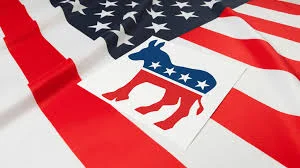Which 2020 presidential platforms support the Black community?
As the 2020 presidential election approaches, many politicians have announced their campaigns with the hopes of winning over the Black community. With many presidential campaigns gaining popularity, the discussion of who will win the Black vote has accelerated and is causing debate over slavery reparations and needed reform of the nation’s criminal justice system.
Photo obtained from 1310 KFKA.
There are currently many Democratic candidates who have spoken openly about race-related policies. Notably, there are four candidates that have been increasingly vocal about supporting the Black community.
Sen. Kamala Harris (D-California)
As the second African American woman to serve as a U.S. Senator, Harris’ campaign was well-received by Democrats across the nation. Her main focus has been criminal justice reform and reviving the middle class. One of her views that is most appealing to Blacks is her support for slavery reparations. This would include holding the system accountable for generations of slavery and institutional racism, as well as addressing its effects on African Americans.
Joined by many of her Democratic colleagues, Harris co-sponsored legislation that would raise the national minimum wage to $15 per hour. This increase would make it possible for minimum wage workers to “support a family … keep a roof over their head and food on the table,” Harris said. Harris will not accept donations from political action committees, so her campaign is entirely run on the donations of her supporters. Her presidential campaign notably raised $1.5 million in the first twenty-four hours following its announcement.
Sen. Cory Booker (D-New Jersey)
As the first Black senator of New Jersey, Booker’s campaign gained momentum in its early months but has suffered from lack of fundraising. The focal point of his platform is to address inequality within the criminal justice system. Booker said he aims to increase minimum wage and support universal healthcare as well.
His stance on legalizing marijuana on the federal level has been controversial amongst fellow Democratic candidates, but it presents relief to African Americans who have suffered from unequal enforcement of drug laws. Booker has introduced The Marijuana Justice Act twice to the Senate with efforts to begin the process of legalizing marijuana and expunging the records of those charged with possession. His campaign also refused to accept donations from corporate political action committees or lobbyists.
Beto O’Rourke (D-Texas)
O’Rourke has been popular amongst many young, white liberals and his policies have the potential to attract Black voters as well. He has been vocal about repairing income inequality, providing affordable healthcare, reforming the criminal justice system and introducing policies to halt climate change.
His platform incorporates most of the elements of the Democratic agenda and does not focus on one topic. His stance on key Democratic issues and frequent calls of accountability for Donald Trump have made him a refreshing contender for the presidential race in the eyes of young voters.
Sen. Elizabeth Warren (D-Massachusetts)
Warren has made great use of social media to grab the attention of young voters, while her many years of political experience attract the support of middle-aged voters. Warren expressed very early on in her campaign that she supports slavery reparations, specifically addressing support for housing of African American communities affected by gentrification.
Warren introduced affordable housing crisis legislation that guarantees housing for those who have long been neglected by an unfair system that favors upper-class, white homeowners. She’s also introduced anti-corruption legislation with the hopes of protecting the working class. Although many of her policies may benefit Blacks, as a white female Democrat, she may benefit from making her campaign appealing enough to those who are racially resentful or have reservations about a female president.

